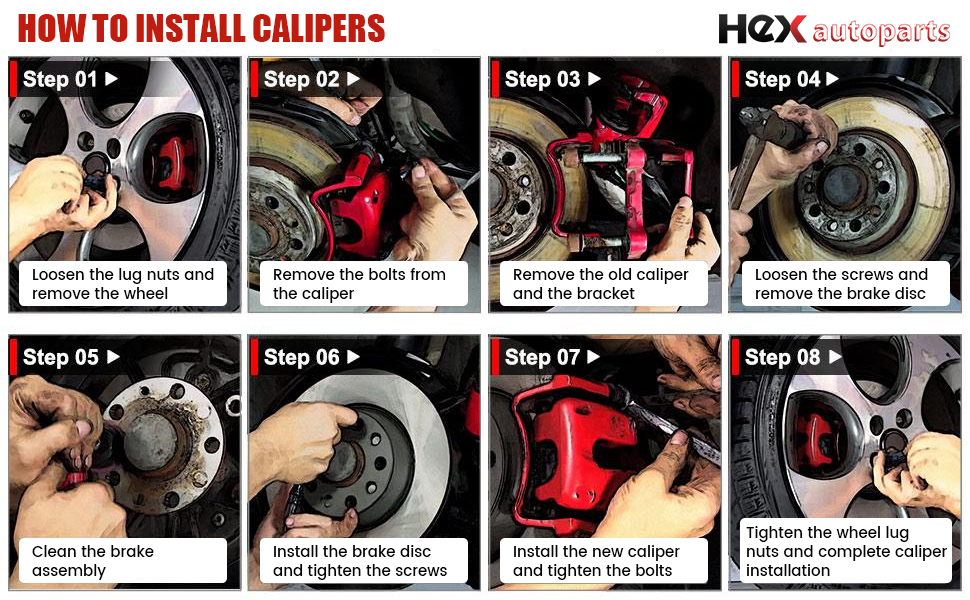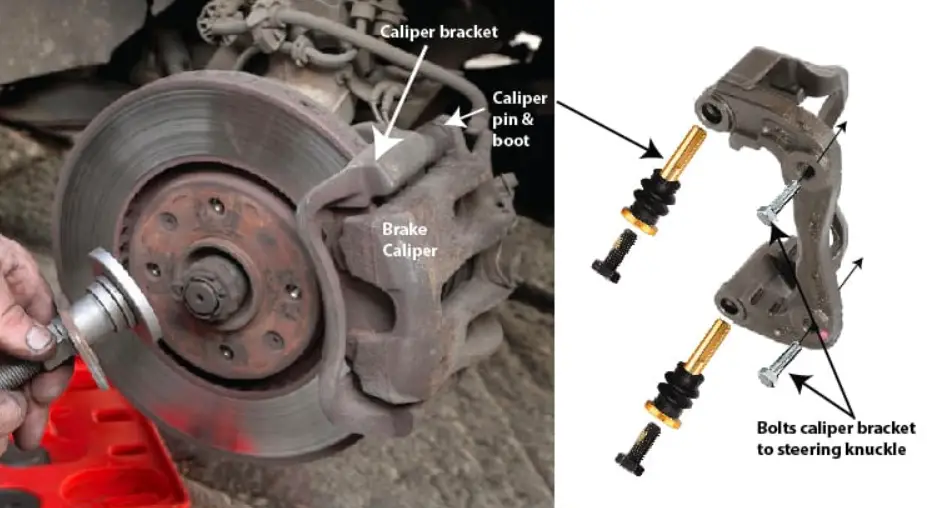Marvelous Tips About Should I Replace All 4 Calipers

Should I Replace All 4 Calipers? A Brake-Down (Pun Intended!)
1. Understanding Your Brake Calipers
Okay, so you're pondering the age-old question: "Should I replace all 4 calipers?" Your car's making some unsettling noises, the brake pedal feels a bit squishy, and your mechanic's eyeing those calipers with a knowing look. Before you resign yourself to a hefty bill, let's dive into what these things actually do and when replacing all four is the right move. Think of calipers as the strong arms of your braking system. They squeeze the brake pads against the rotors, creating the friction that slows you down or brings you to a stop. Each wheel has one (or sometimes more!), and they work together to keep you safe on the road.
Now, these "arms" aren't invincible. Over time, they can corrode, develop leaks, or just plain wear out. This is especially true if you live in an area with harsh winters and salted roads. Regular brake maintenance, including fluid flushes, can help prolong their life, but eventually, the inevitable happens. Ignoring a failing caliper can lead to uneven braking, reduced stopping power, and even damage to other brake components like your rotors. Trust me, you don't want that domino effect happening to your wallet.
The health of your brake calipers directly impacts your safety, and the safety of everyone else on the road. Don't take it lightly! A properly functioning braking system is essential for avoiding accidents and maintaining control of your vehicle. So, if you suspect an issue, getting it checked out promptly is always a good idea. It's better to be safe than sorry, and a small investment now can save you from much bigger problems down the road (literally).
Consider this: A faulty caliper on one side of your car could cause that wheel to brake harder than the others. This can lead to the car pulling to one side during braking, especially in emergency situations. This is a dangerous situation, and something you definitely want to avoid. Replacing all four calipers can eliminate this potential hazard, ensuring that your braking system is balanced and performing optimally.

How To Replace A Brake Caliper?
When is Replacing All 4 Calipers Necessary?
2. Assessing the Situation
Alright, so when does "should I replace all 4 calipers" become a resounding "YES!"? There are a few key scenarios. First, if one caliper has failed and is leaking brake fluid, severely corroded, or seized, it's a sign the others might not be far behind. Calipers tend to age similarly, especially if they've been subjected to the same environmental conditions. So, if one is showing its age, the rest are likely reaching the end of their lifespan too.
Another compelling reason is if you're already replacing other major brake components. If you're getting new rotors and pads, it's often a smart move to replace the calipers at the same time. This ensures that all the parts are working together optimally and minimizes the risk of future problems. Plus, it can save you money on labor costs in the long run, since the mechanic will already have the wheels off and be working on the brake system. It's kind of like replacing all the tires at once — better performance and peace of mind.
Sometimes, a mechanic will recommend replacing all four calipers even if only one has failed. This is often based on their experience and knowledge of your vehicle's history. They might notice signs of wear or corrosion on the other calipers that aren't yet causing problems, but could soon. In these cases, it's important to trust your mechanic's judgment and ask for a detailed explanation of their reasoning. A good mechanic will be able to show you the evidence that supports their recommendation.
Finally, think about the age and mileage of your vehicle. If your car is getting up there in years and has a lot of miles on the odometer, the brake calipers are likely nearing the end of their service life. Even if they're not currently causing problems, replacing them proactively can prevent future breakdowns and keep your braking system in top condition. It's like giving your car a little birthday present to ensure it continues to run smoothly for years to come.

The Pros and Cons of Replacing All Four
3. Weighing Your Options
Let's be real, replacing all four calipers isn't exactly a cheap proposition. But before you dismiss the idea, consider the potential benefits. Replacing all four at once ensures balanced braking performance. This means that each wheel will brake with equal force, providing better stability and control, especially in emergency stopping situations. It's like having a perfectly balanced teeter-totter — smooth and predictable.
Another advantage is that it simplifies maintenance. By replacing all the calipers at once, you're essentially resetting the clock on your braking system. This means you won't have to worry about one caliper failing shortly after you've replaced another. It's a proactive approach that can save you time and money in the long run. Plus, you'll have the peace of mind knowing that your entire braking system is in good working order.
However, there are also downsides to consider. The most obvious is the cost. Replacing four calipers is significantly more expensive than replacing just one. You'll need to factor in the cost of the parts, labor, and any additional components that may need to be replaced, such as brake pads or rotors. It's important to get a quote from a reputable mechanic and compare prices before making a decision. Remember, cheapest isn't always best when it comes to safety.
Another potential drawback is that it may not always be necessary. If only one caliper has failed and the others are in good condition, replacing just the faulty one may be sufficient. However, this depends on the age and mileage of your vehicle, as well as the overall condition of the braking system. Ultimately, the decision of whether or not to replace all four calipers is a personal one that should be based on your individual circumstances and the advice of a trusted mechanic. Consider it an investment in your safety and your car's longevity.

How To Replace Front Brake Calipers On Any Car 1A Auto
Spotting the Signs of a Failing Caliper
4. Recognizing the Warning Signals
Knowing when to even consider "should I replace all 4 calipers" starts with identifying the symptoms of a failing caliper in the first place! The first sign that something's amiss is often a pulling sensation when braking. If your car veers to one side when you hit the brakes, it could indicate that one caliper is not functioning properly. This can be a dangerous situation, especially in wet or slippery conditions.
Another common symptom is a spongy or soft brake pedal. This can be caused by air in the brake lines or a leaking caliper. When you press the brake pedal, you should feel a firm and consistent pressure. If the pedal feels soft or goes all the way to the floor, it's a sign that something is wrong with the braking system. It's like trying to squeeze a marshmallow — not very effective.
Unusual noises are also a telltale sign of a problem. Squealing, grinding, or clicking sounds when braking can indicate worn brake pads, damaged rotors, or a sticking caliper. These noises should not be ignored, as they can indicate a serious problem with the braking system. It's like your car is trying to tell you something — listen up!
Finally, visually inspect your calipers for signs of leaks or corrosion. Look for brake fluid pooling around the calipers or on the wheels. Corrosion can also weaken the caliper and cause it to fail prematurely. If you notice any of these signs, it's important to have your brakes inspected by a qualified mechanic as soon as possible. Don't wait until the problem gets worse and potentially puts you and others at risk. A little preventative maintenance can go a long way in ensuring your safety on the road.

Making the Right Decision
5. Seeking Expert Advice
Ultimately, deciding whether or not "should I replace all 4 calipers" requires a professional assessment. Don't just rely on internet advice (even this article!). A qualified mechanic can inspect your entire braking system and provide you with a detailed explanation of its condition. They can identify any potential problems and recommend the best course of action based on your specific needs and budget. Think of them as your car's personal doctor.
When consulting with a mechanic, be sure to ask questions and get a clear understanding of their recommendations. Ask them to explain the reasoning behind their advice and to show you any evidence that supports their conclusions. A good mechanic will be happy to answer your questions and provide you with all the information you need to make an informed decision. Don't be afraid to get a second opinion if you're not comfortable with the mechanic's recommendations.
Also, consider the long-term costs and benefits of each option. While replacing all four calipers may seem expensive upfront, it could save you money in the long run by preventing future breakdowns and ensuring balanced braking performance. On the other hand, replacing just the faulty caliper may be a more cost-effective option if the others are in good condition. Weigh the pros and cons carefully before making a decision.
Finally, remember that your safety is the top priority. A properly functioning braking system is essential for avoiding accidents and maintaining control of your vehicle. Don't skimp on brake repairs or maintenance, as it could put you and others at risk. Invest in quality parts and professional service to ensure that your braking system is in top condition. It's an investment in your safety and peace of mind.
